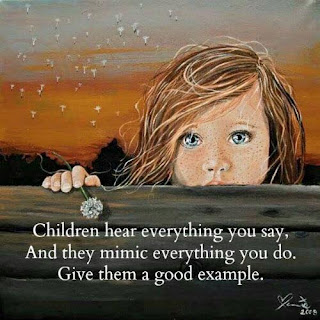Lead by Example
You cannot tell a child, “do as I say, not as I do”, and expect these words to make a lasting impression. What will make an impression and form their behaviors are the things you do and say in their presence.
How you treat your children, family, friends, and
acquaintances will be the basis of how they learn to interact with others. The
foundation that is laid out before them at a very young age will determine what
kind of adolescent, and adult, they will turn out to be.
If a child is bullied at home it will have a ripple effect.
This behavior will eventually be mirrored as they interact with their peers in
the classroom or on the playground. Having no power at home, they will exert
their aggression on others as it has been done to them.
This conduct can come in the form of physical or emotional
abuse. At a minimum it will be name calling or mocking someone to show their
“dominance”; trying to induce others to do the same. Worst case scenario is
using physical abuse against a classmate. Either way, this is not the
environment any of us want our children exposed to.
Regardless of our personal feelings or beliefs, at the core
of every human is the desire to be a good person. It is inconceivable that
anyone is born with the predilection to be angry and filled with hate for
others, or that they wish to impart harm to others with their words or actions.
With our unlimited capacity to do what is honorable and be
kind to others, it is extremely difficult to understand how the world so easily
slipped into a spiraling tornado of negativity. How did harsh words and mean
spirited behavior become commonplace? Is it any wonder that our children are
emulating what they see on a daily basis?
We can turn this around, and we should want to turn it
around. We are responsible for our actions and words, and we are also
responsible for our children’s behavior. What they say and do is deeply
connected to what they observe in our behavior.
Our children are a precious gift and we have a
responsibility to set an example for them. If we have the capacity to be
honorable and kind, shouldn’t this be how we conduct ourselves at all times? By
setting this kind of example, we will set the stage for them to become the kind
of adolescents and adults we all would want to know.




Comments
Post a Comment